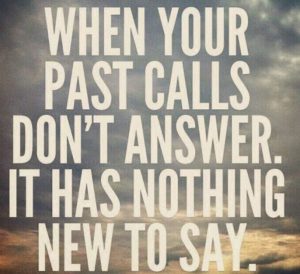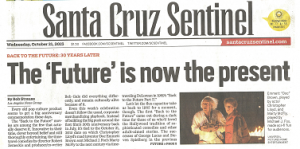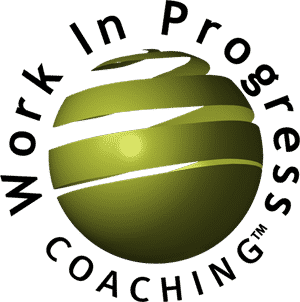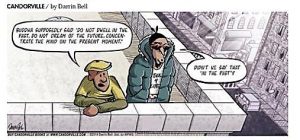Riddle me this: No matter your gender or geography, your doubts or desires, your highs or lows, if you lead 5 or 500, you are always influenced by me. What am I? Answer: The conversation you have about the future.
The conversation that is shaping your life, how you lead, how you follow, right now, is the story you tell yourself about the future. Your story tells you what is and what isn’t possible, what will and what won’t rock the boat, what’s too risky to do and what’s too important not to do. Your story about the future guides your actions today. In a very real sense, you are living your future right now.
Time zone syllogism
Rather than focus on the content of our stories, let’s look at what helps to determine the content itself. What helps determine the content of our story is our relationship to the future. Do we see the future as an extension of the past or as a possibility we can author?
Syllogism:
- Premise: We can only act in the present.
- Premise: Our future is ours to author.
- Conclusion: Our actions in the present match the future we author.
Past-based future
Listen to Mark’s narrative: “Today, I’m a supervisor of 9 people. Someday, I’ll be promoted to manager. Then, when I’m a manager, things will change. People will have to listen to my ideas and I will be more satisfied because I won’t have to put up with time-wasting supervisor meetings. Till then, for a few more years, I’ll keep my head down, my mouth shut.”
Take a look at how “someday” and “then, when” influence how Mark acts today. His then/when tells him to hunker down (PC for “suck it up”) and to not make the meetings he’s running as supervisor more useful right now. What’s telling Mark to stick to the status quo and not make the meetings more useful today? The future story he is unwittingly seeing.
 Mark’s future narrative might sound like this: “Others have done this…it’s just how it is… Oh, well.” Mark has flipped the part right over into his future and seeing only certain actions to take. Mark doesn’t even see the possibility of doing something now to have the supervisor’s meetings be meaningful.
Mark’s future narrative might sound like this: “Others have done this…it’s just how it is… Oh, well.” Mark has flipped the part right over into his future and seeing only certain actions to take. Mark doesn’t even see the possibility of doing something now to have the supervisor’s meetings be meaningful.
Living a past-based future isn’t all bad. It’s somewhat predictable, safe, knowable. We know how we acted yesterday, we made it through, so let’s keep going on that same path. If you liked yesterday, why not repeat it? But, if your experience of yesterday wasn’t as stimulating and satisfying as you wanted it to be, if it left something to be desired, then what? What’s an alternative path?
Possibility-based future
The alternative is to generate a future that is possibility-based. A future story can be informed by the past, but isn’t limited by it. A possibility-based future isn’t guaranteed. It isn’t certain, yet living into a possibility invites you to take actions very different from hunkering down and waiting. It calls you to step outside your comfort zone and generate actions that match the possibility.
Big tip: Living into a created, generated future isn’t a one-time event. You have to keep generating it, daily, otherwise the past drifts in to obscure what you were generating. Bigger tip: If this happens, start again.
To author a future you desire, one that encourages you to lead with purpose, start by saying what you see as possible. You aren’t committing to these possibilities yet, you are generating them. You’ll find that the more you generate possibilities, the more some of them will begin to be so compelling that you’ll want to commit to make them happen. Then commit.
 Now, work back from that future to design going forward. No, I didn’t mistype that last sentence. Generating a future possibility requires standing in the future that hasn’t happened yet, thinking from there, and saying: What must happen right before this future is realized? Then take the next step back toward now and ask again: What must happen right before that?
Now, work back from that future to design going forward. No, I didn’t mistype that last sentence. Generating a future possibility requires standing in the future that hasn’t happened yet, thinking from there, and saying: What must happen right before this future is realized? Then take the next step back toward now and ask again: What must happen right before that?
Want to bring awesome power to this way of leading and living? Share your possibilities with your colleagues and ask them what they see. What possibilities do they see? There’s work to be done, and you’ll get to it, but first, turn on the generators.
| The conversations we have today give us a future to live into. Tim Seeton |
Subscribe
Get Camille's latest posts!

